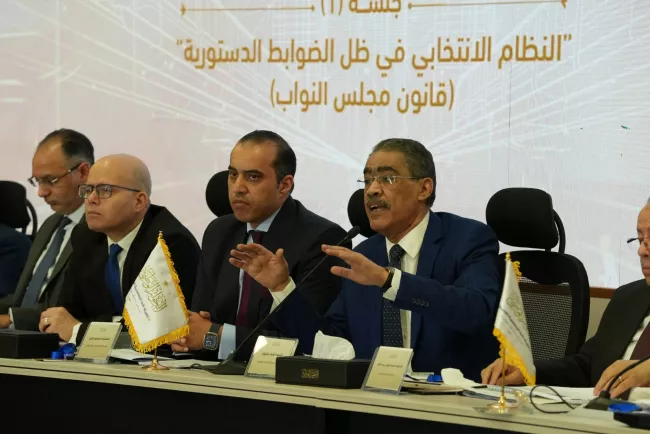
Egypt's perpetual stagnation: Another election, another missed opportunity
For a decade, Egypt’s political pulse has barely flickered. The public square is sealed, opposition parties are beleaguered, and the same familiar faces dominate a landscape stuck in a purgatorial “gray zone”—neither truly liberalized nor entirely moribund. The headlines are recycled, the details rehashed, and the screen -long abandoned by a weary audience- remains stubbornly static.
A recent tempest, seemingly legal but undeniably political, briefly stirred this stasis, centered on the acrimonious debate over electoral law changes passed by the House of Representatives on May 25. These amendments codified a hybrid system, combining absolute closed lists—a winner-take-all model for districts—with individual candidacies.
Before their finalization, these proposed changes had, however fleetingly, rekindled a fragile hope for return to a more authentic politics. A revised framework, perhaps incorporating proportional lists, could have safeguarded a vital degree of political diversity, transforming upcoming elections into a long-overdue stride forward.
Another missed opportunity
With re-adoption of the existing electoral law, albeit with minor tweaks, Egypt has squandered yet another precious opportunity for a genuine political breakthrough, one that could have fostered diversity and meaningful party participation. The government and its loyalist allies, it seems, view the upcoming parliamentary elections as nothing more than a contest for seats, willfully blind to their potential as a gateway to the broader political opening the country so desperately needs.
A few months of competitive campaigning and robust public engagement could have shattered years of entrenched stagnation. The true significance of these elections lies not in the final seat count for each party, but in their capacity to serve as a genuine transition—from torpor to dynamism, from a besieged political space to an expansive, inclusive arena where all can participate.
Egypt needed a more expansive vision, one that transcended immediate gains to lay the groundwork for a brighter future. Such a vision would have enriched the entire political landscape and instilled a much-needed sense of hope in a serious, pluralistic political life.
It would have served the state’s own interests to present these elections as a substantive political exercise rather than a mere cosmetic adjustment. This could have inaugurated a true political process, one that reconnected society, re-opened critical national debates, liberated politics from its stifling confines, and created space for competing ideas, perspectives, and programs to genuinely serve the nation.
Through vigorous electoral competition, the pressing issues confronting Egypt’s future, especially in a nation grappling with severe economic and political challenges and escalating national security threats, could have finally taken center stage.
Monopolizing politics actively hinders Egypt’s capacity for recovery and weakens its ability to confront its most formidable problems. This, naturally, necessitates laws that cultivate the long-absent political diversity, ideally following the release of all prisoners of conscience.
“Elections are an opportunity for political transition”—this should be the prevailing slogan, now, not tomorrow. Before ratifying these laws, the government possessed a critical chance to demonstrate its willingness to steer Egypt onto a new political trajectory. But all sides, it appears, chose to ignore the profound benefits of such a shift.
This alternative path would have been demonstrably safer for the country’s future than the current course of suffocating political life, clinging solely to loyalists, and stubbornly adhering to outdated electoral laws that have outlived their utility, serving only to entrench authoritarianism, nullify millions of votes, and shrink political life.
Meeting this critical moment with seriousness is the salvation of both the present and the future demand. Instead, a “closed list” materialized, further intensifying the closure of the public sphere.
Electoral laws: A recurring battle
Disputes over Egypt's electoral laws are far from novel. The fraught tug-of-war over their design has persisted for decades, long predating the Jan. 25 Revolution. Each successive government, irrespective of its character, has meticulously crafted an electoral system designed to serve its own narrow interests rather than the public good. The perennial objective: to amass as many votes as possible and secure the largest number of parliamentary seats for friendly figures.
In the 1980s, the Supreme Constitutional Court, acting as a crucial check, struck down election laws more than once, compelling the government to revise them. In 1987, the court dissolved parliament on the grounds that the absolute closed-list system was unconstitutional. It issued a similar ruling in 1990, this time against the proportional list system. At the time, Egypt’s highest court explicitly declared that these “manufactured” election laws violated the constitution and failed to uphold the fundamental principle of equality.
Egypt has repeatedly cycled through absolute closed lists, proportional lists, and individual candidacy systems. Each iteration has seen the political powers of the day manipulate the process to tighten their grip on legislative authority. The now-dissolved National Democratic Party/NDP left behind a long and ignominious legacy of electoral fraud and manipulation. The 2010 parliamentary elections, with their blatant rigging, served as one of the primary catalysts for the Jan. 25 Revolution. Electoral laws, it is clear, have consistently been a tool in the hands of those seeking domination and autocracy.
A mere glance is often enough to predict the outcome before an election even begins. Observe the electoral system and the meticulously drawn districts, and the results become apparent before a single ballot is cast.
Thus, today’s debate over the new laws is hardly surprising—and, in a sense, could have been healthy, offering a flicker of hope. Instead, it delivers a familiar despair. With all power vested in the government and parliament, both chose the path that guarantees a return to the worn political playbook that began nearly a decade ago.
The National Dialogue and the elections
During the National Dialogue process, launched by the president in 2022, the topic of elections featured prominently. From its inception, discussions on the parliamentary electoral system ignited sharp divisions between pro-government and opposition groups.
Opposition parties consistently advocated for the adoption of a proportional list system, arguing it would safeguard political diversity, ensure fair representation, and signal a genuine willingness to open up a tightly controlled public sphere.
Meanwhile, government-aligned parties adamantly refused to abandon the closed-list system, asserting its purported role in guaranteeing political stability. The resulting laws confirmed the grim reality: no meaningful change is on the horizon, no shift away from the absolute closed-list system, no move towards a more pluralistic and competitive political arena.
By adopting these laws, the government effectively dismissed the painstakingly deliberated outcomes of the national dialogue, signaling its unequivocal preference for a “guaranteed” electoral system that ensures a comfortable majority in parliament. In the last elections in 2020, under this very same system, parties close to the state seized near-total control of the House of Representatives.
In approximately two months, the current parliamentary session will conclude, paving the way for new elections. Yet, profoundly, nothing has changed. The political status quo remains firmly entrenched, reinforcing a stagnant and besieged system. All signs suggest there is no genuine desire for fundamental change or a new direction. The only apparent aim is superficial adjustments that leave the core of the political system utterly untouched.
The elections could have been a pivotal moment for change. Instead, they have been subsumed by an unyielding drive to monopolize power at all costs.
Published opinions reflect the views of its authors, not necessarily those of Al Manassa.

